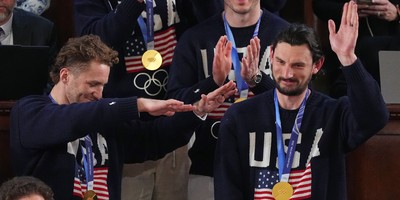When President Bush and Pope Benedict XVI stood together on the White House lawn in a majestic welcoming ceremony, it symbolized the growing rapprochement of American evangelical Protestantism and the Catholic Church.
It was West Texas meets Rome; plain-spoken man of faith meets intellectual of great depth; representative of America's awesome secular power meets representative of the spiritual power of Christianity. Even so, more united them than separated them, with President Bush approvingly quoting Benedict and the pope delivering -- for such a reserved man -- a notably warm blessing of America.
The Catholic Church long was suspicious of America as a freewheeling Protestant nation that rejected the state support for religion seen in Europe. Not anymore. The separation of church and state as practiced in America has given religion the space to flourish and the respect necessary for it to inform public discourse. Thus, faith -- and the Catholic Church -- retains its vitality.
In the wake of the French Revolution, in contrast, many European nations developed what Benedict calls a "conflictual" separation of church and state. A godless state sees its role as chasing the vestiges of Christianity from the public square. As it has succeeded, Europe has been robbed of its civilizational vigor. "Europe seems hollow," Benedict has said, "as if it were internally paralyzed by a failure of its circulatory system."
If Benedict reflects the Catholic Church's new attitude toward America, evangelicals in turn have warmed to the church. It's not the "Whore of Babylon" of yore, but an ally in a deep-seated cultural struggle. As Benedict himself has said of evangelicals, "They have come to see Catholicism as a defender against the pressures of secularization and an upholder of the same ethical values that they themselves profess."
Recommended
He might as well have been speaking of President Bush, a man famous for his impatience for pomp and circumstance who went all out -- from a 21-gun salute to a four-tiered, lemon-flavored birthday cake -- for the pontiff. Bush told Benedict, "In a world where some no longer believe that we can distinguish between simple right and wrong, we need your message to reject this 'dictatorship of relativism.'"
The phrase is one of Benedict's signature lines. It was featured in his homily at the 2005 Mass for the papal conclave that so impressed his fellow cardinals before they selected him as pope. Benedict's point was that if relativists consider any claims of moral truth as inherently oppressive, they feel justified in attempting to muzzle those who make them. In Benedict's words, they "seek to subordinate all religions to the super-dogma of relativism."
This tendency is particularly well-advanced in Europe, where the European Union is a relativist superstate hostile to traditional Christian morality. One of Benedict's missions in his trip here is to provide Americans a common vocabulary for resisting an aggressive secularism. This accounted for the extraordinary spectacle of a pope on the White House lawn -- itself unimaginable a century ago -- explaining the fundamentals of American civil religion.
The foundation of our freedoms isn't a thoroughgoing skepticism, but a profound, "self-evident" moral truth: that we have inalienable rights. "America's quest for freedom has been guided by the conviction that the principles governing political and social life are intimately linked to a moral order based on the dominion of God the Creator," Benedict said. The Holy Father quoted the Father of Our Country for the proposition that morality and religion are the "indispensable supports" of our political order.
Of course, Benedict wasn't at the White House to bless any political agenda. If he appreciates Bush's pro-life commitment and his fight against AIDS in Africa, he opposes the Iraq War and "cowboy" diplomacy. Nor is all well with the American Catholic Church. Benedict has been insistent in his condemnation of the child-abuse scandal and its handling.
But the pope came bearing important truths about the roots of our experiment in liberty, from which all Americans can benefit.

























Join the conversation as a VIP Member